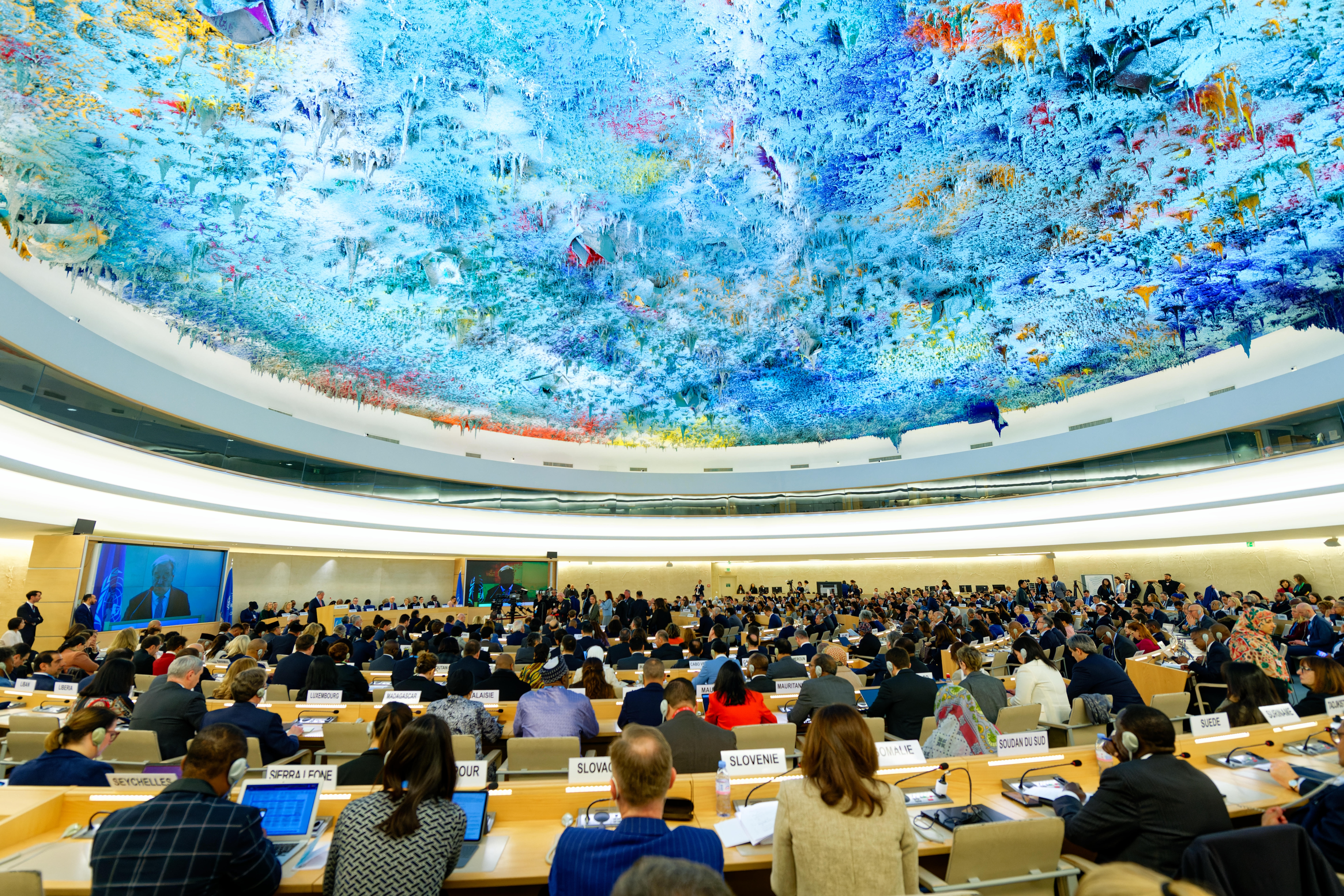October 14, 2025

Genève, Suisse, 24 février 2025 : Le Secrétaire général des Nations Unies, António Guterres, s'adresse au débat de haut niveau de la 58ème session du conseil des droits de l'homme aux Nations Unies à Genève. © Joan Sutter, licensed under Shutterstock.
In January 2025, Iraq underwent its fourth Universal Periodic Review (UPR), a peer-review mechanism through which UN Member States make recommendations to the country under review to advance compliance with its international obligations. Iraq received a total of 263 recommendations covering a broad spectrum of human rights issues. At the adoption of its UPR outcome during the Human Rights Council’s 59th session in July 2025, Iraq announced that it supported 181 recommendations.
While the high proportion of accepted recommendations is a positive step, it also represents a 26% decrease compared to the acceptance rate recorded during its previous cycle. Meaningful change will depend on their effective implementation, an area where Iraqi authorities fell short following the country’s last UPR in 2019.
National human rights institution (NHRI)
Iraq accepted all three recommendations concerning the Iraqi High Commission for Human Rights (IHCHR), including calls to bring it into full compliance with the Paris Principles, enshrining the international standards set for NHRIs. These commitments come at a time when serious concerns have been raised regarding the IHCHR’s lack of independence and impartiality. In October 2024, the Global Alliance of National Human Rights Institutions, the key global expert body assessing NHRIs’ compliance with international standards, recommended that the IHCHR be downgraded from “A” to “B” status. This decision echoed MENA Rights Group’s findings which underscored the IHCHR’s failure to meet international standards in law and practice.
Cooperation with international human rights mechanisms and accession to international instruments
Iraq rejected, or merely “noted”, all recommendations related to the ratification and accession to international instruments, including the Optional Protocol to the Convention against Torture and the Second Optional Protocol to the International Covenant on Civil and Political Rights.
The country’s seeming lack of willingness to further its cooperation with the international human rights system comes as the United Nations Assistance Mission for Iraq (UNAMI) is set to cease its operations on December 31, 2025, following the Iraqi Prime Minister’s request that its mandate be “terminated definitively”.
The death penalty
During its fourth UPR, Iraq rejected all recommendations calling for the abolition of capital punishment, maintaining the same stance it adopted during the third cycle. The authorities also failed to accept two recommendations urging it to reduce the number of crimes punishable by death to the most serious crimes under international law and to encourage public debate on a moratorium.
In practice, as explained in our report, Iraqi authorities resumed executions in December 2023, ending a three-year hiatus. Since then, hundreds of detainees held in Nasiriyah Prison have reportedly been executed in secret, many following deeply flawed terrorism trials that failed to meet fair trial standards. Hundreds more are believed to have been executed under similar circumstances, while thousands remain at risk of imminent execution. UN experts have warned that these summary executions may amount to crimes against humanity.
Enforced disappearances
As Iraq records one of the world’s highest rates of enforced disappearances, with estimates ranging from 250,000 to one million missing persons, the country accepted the recommendation received by Mexico to “approve the bill on enforced disappearance, which would classify enforced disappearance as an autonomous crime, and strengthen collaboration with the Committee on Enforced Disappearances ”. The issue of enforced disappearance had been specifically highlighted in MENA Rights Group’s report submitted ahead of the UPR, which recommended that Iraq define and criminalise enforced disappearance as an autonomous offence, and urgently clarify the fate and whereabouts of disappeared individuals, including by responding to all urgent actions issued by the Committee on Enforced Disappearances.
Freedom of opinion and expression & access to information
During its previous UPR, Iraq committed to respecting the rights to freedom of expression, association, and peaceful assembly, both in law and practice. However, these commitments have not been implemented.
Iraq once again accepted all recommendations related to these fundamental freedoms, including those calling for the protection of journalists, activists, human rights defenders, and social media figures. Iraq notably accepted recommendations put forward by the Republic of Korea, Canada, and Ukraine to guarantee freedom of expression online and offline. Iraq also accepted the United Kingdom and Northern Ireland’s recommendation to protect the right to freedom of assembly, including by holding accountable perpetrators of violence against protestors. These human rights concerns were thoroughly documented and reflected in MENA Rights Group’s report dedicated to the escalating crackdown on civic space in Iraq and the Kurdistan region of Iraq.
Commitments must be met with concrete reforms
While Iraq accepted the majority of recommendations, many risk remaining on paper without concrete action. The rejection of key recommendations, particularly those relating to the abolition of the death penalty and accession to core human rights treaties, raises further doubts about the authorities’ willingness to undertake genuine reform.
MENA Rights Group urges the Iraqi and Kurdish authorities to uphold their commitments and take meaningful steps to address key human rights issues in the country, notably by working towards an effective NHRI, ending the practice of arbitrary detention and summary executions, clarifying the fate and whereabouts of those forcibly disappeared, and protecting civic space.






